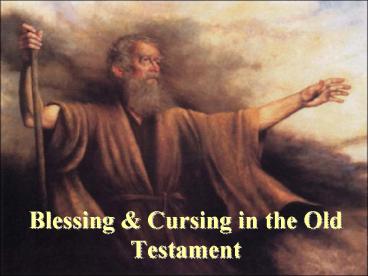Blessing PowerPoint PPT Presentation
1 / 9
Title: Blessing
1
Blessing Cursing in the Old Testament
2
3.3.3 Bless / Curse
- 1. Introductory Question
- 1.1 What is an appropriate definition of "bless"
/ "blessing" and "curse" / "cursing"? - 1.2 Is there a "magical" worldview behind the
concepts of "blessing and cursing"? - 1.3 Do "words" really have the power to change
things?
3
3.3.3 Bless / Curse
- "In the Bible, blessing may be understood as a
performative utterance (see Austin 1962 1979),
the effective activity of pronouncing and
bringing about good for someone. It may be the
resultant favor (benefaction) or enablement
itself. Blessing may also be an act of greeting
or prayer that invokes good for someone or seeks
to avert or neutralize evil. Finally, it may be
an act of praise by which a benefactor, human or
divine, is acknowledged and thanked for benefits
received or expected. The meaning of cursing is
just the opposite. It may refer to the
pronouncement of evil which brings about
punishment or harm to someone, the actual harm or
punishment effected, or an invocation of the
same. It is unthinkable, however, that one would
curse the deity (Lev 241016), even for some
harm one might attribute to Gods neglect or
disfavor (Job 2910)." Urbrock, "Blessings and
Cursings," ABD
4
3.3.3 Bless / Curse
- "The magical conception would attribute
inherent power, for example, to a certain form of
pronouncement, so that the benediction or
malediction once spoken must automatically bring
about its result, barring pronouncement of an
equally or more effective counter-curse or
-blessing. The religious conception, by
contrast, would attribute the power and efficacy
of a blessing or curse to the cooperative will
and action of God or the gods." Urbrock
5
3.3.3 Bless / Curse
- The ancient Israelites, along with other
contemporary cultures, attributed unusual power
to the spoken word (Heb daµbaµr) once uttered,
the word would practically take on a life of its
own and continue in effect whether or not
circumstances changed or the original speaker had
a change of mind. Thiselton (1974) strongly
questions the supposed independent power of words
in the Bible. The power of words in general, and
of blessings and curses in particular, presumably
depends upon the disposition (favorable or
unfavorable), power, and status of the person who
utters them, the circumstances under which they
are spoken, and the expectations and receptivity
of the audience for or about whom the words are
spoken. The Bible presents blessings and curses
as neither automatic nor irrevocable." Urbrock
6
3.3.3 Bless / Curse
- 2. Terms of Blessing
- 2.1 brk to bless
- 2.2 hnn "to act favorably or graciously"
- 2.3 rsh ra4son "be favorably pleased,"
"favor" - 2.4 slh "to advance or prosper"
- 2.5 hesed "loyalty/magnanimity/kindness"
- 2.6 God/Yahweh is with ((im or )et) the person
- 2.7 )asre "happy"
- 2.8 sa4lom
7
3.3.3 Bless / Curse
- 3. Terms for Cursing
- 3.1 )lh an vocal or written imprecation, a curse
pronounced. Scharbert (TDOT, 126164) adds that
Heb ltaµlaÆ was commonly used in legal situations
as a conditional curse or oath used to prove
guilt, protect property, or ratify a treaty. - 3.2 )rr used with brk often as a participle with
the basic sense of "spell," connoting a banning
or barring from benefit. Scharbert notes that the
ltaµruÆr formula was the most powerful decree
expressed by someone in authority to deliver over
a transgressor to misfortune (TDOT, 1411).
8
3.3.3 Bless / Curse
- 3.3 qll wide semantic field with disrespect and
verbal / physical abuse involved. Scharbert notes
that in the Balaam story (Numbers 2224), the
uncommon Heb root qbb alternates several times
with ltrr, while Heb zgtm also occurs once. - 3.4 "Also within the semantic field of cursing
are the ban (Heb h9erem) which singled out
persons or groups for extermination (e.g., Joshua
7), the interjections Heb ltoÆy (Woe! e.g., Isa
65) and hôy (Ha! e.g., Jer 2218), and
expressions of divine withdrawal or displeasure
such as Gods hiding or turning away the
face.
9
3.3.3 Bless / Curse
- 4. The Power and Author behind Blessing
Cursing - 4.1 Since Yahweh is the source of all good and
evil (Isa 45.5-7 Job 12.13-25), from a "biblical
view, therefore, no blessing or curse can become
operative without the assent of this God."
Urbrock - 4.2 Curses that were overturned Micah (Judg
17.1-3) Jonathan's (1 Sam 14). - 4.3 Rituals of blessing involve laying on of
hands (Gen 48.14) or the ritual sharing of food
drink (Gen 14.18-20). Rituals of cursing include
throwing stone dust (?) in 2 Sam 16.5-14,
drinking of curse water (Num 5.19-28), smashing
pottery (Jer 19.1-13 Egyptian background?). The
oath swearing ritual of cutting animals, etc.
(Gen 15.9-10). N.B Deut 27!

